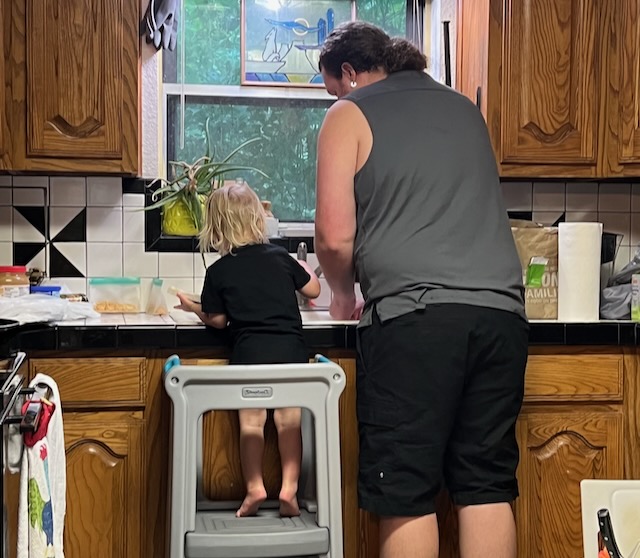The toddler age group is generally seen as one of the more challenging when it comes to parenting. We are prone to disagree. While parents and toddler’s alike may struggle at times with the limited communication abilities that come with the age, it turns out that there is one big thing you can do to get your toddler engaged and happy. Help them get to work.
As the picture of our two year old grandson shows, sometimes you just need a boost. Providing that boost can create a great opportunity to learn practical life skills, eliminate tantrums and frustration, and replace failure cycles with some hard-earned successes and a healthy dose of deserved self-esteem. Knowing this can put successful toddler parenting within easier reach.
Toddlers are in many ways trapped within their biological limits. They see big people doing things and find that they can’t get their bodies to do them the same way. This is frustrating. They feel frustrations the same way we all feel them, but they are unable to communicate those feelings in a clear way. They end up coming out as tantrums. Some examples of how this can be triggered:
- A two year old is given a toy that is visually appealing and lures them in to explore. However, the toy requires greater hand-eye coordination and dexterity than they currently possess. This is a recipe for failure as well as a tantrum.
- A play area contains a toy box that quickly fills with the odds and ends of toddler life. When they approach it to find an activity they are overwhelmed with the mess. As they pick through and pull items out to find the one right thing to play with they leave an even bigger mess. When they are told to pick up they are confronted with chaos and do not possess the skills yet to see the path to “picked up”. Another opportunity for failure and tantrums.
- Every day activities such as hand washing, teeth brushing, and hair combing require that they be pinned against a counter or confined in a chair in order to “reach”. Pin yourself against something for a bit and see how you feel. Ask yourself if you would want to do it again?
As parents, there are things you can do to help your toddler break through these challenges. In the process you create opportunities for success and present examples of how continuing to try pays positive dividends. Nothing could be more Montessori. Let’s take a look at the examples above and figure out some ways we can better promote successful toddler parenting while also facilitating success for our children.
Look for age appropriate toys. “Age appropriate toy” is a phrase that actually has meaning to it. While most of us would not give a marble to an infant that is in a stage of putting everything in their mouth, many will give a toddler a toy that requires fine motor skills and expect them to just figure it out. A perfect example is puzzles. A two year old is perfectly capable of working a puzzle as long as the puzzle possesses the right features for them to succeed. Hand a toddler bordered or open puzzles meant for older children and they will have issues picking up and manipulating the thin pieces and are likely to get frustrated and throw a tantrum. Presenting them with a puzzle that has individual pieces featuring grab handles that are designed to help hold them while they are manipulated into individual slots will give you a great shot at success. Look at the packaging on these puzzles and – wow – they will say “for ages 2-3”.
Use work shelves instead of toy boxes. Shelves are inherently easier to organize than boxes and also provide the ability to present work and play opportunities in a way that is both simpler to see options as well as easier to take things out and put them back. If you want to master some advanced toddler parenting, cycle work through the shelves on a regular basis. Watch what your child plays with over time and when it becomes a dust gathering apparatus rather than a favorite past time, put it away and replace it with something new. Bring it back maybe a month or two later and see if it gets attention. If it doesn’t, that means it is time to go to the donation bin. The combination of limiting selection and providing toys that are enticing and challenging (but still offer opportunities for success over frustrating failures) makes for an ideal toddler play environment.
Provide child size versions of adult implements. We don’t mean toy versions. We mean actual brooms, mops, work gloves, scrubber brushes, and more that just happen to be child sized. They are all readily available if you look and it is a great way to get your toddler engaged in the practical life skills they will use… well… forever. Moreover, these implements help satisfy their desire to do what they see Mom and Dad doing. This is yet another source of self-esteem. Beyond these implements, we can never recommend strongly enough the purchase of one of more step stools that help bring your child up to table or counter height. Toddlers can bake, they can wipe down counters, they can do their own dishes, they can wash their own hands, they can brush their own teeth, and they can comb their own hair. Providing them the ability to do so without pinning them up against a counter is probably going to make habit building a bit easier.
No matter what you do, your toddler is going to encounter things that frustrate them and the inevitable tantrum will surface. Successful toddler parenting isn’t based on a one hundred percent calm day with your child. By providing an environment for your toddler that helps promote succes you can help build skills and the right attitudes toward exploration as well as limit failure cycles. Check out some of our links on our Montessori at Home page for ideas on where you might start.





